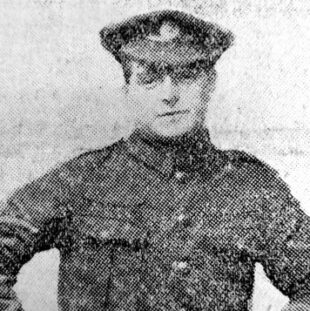Mexborough and Swinton Times, April 1916

A Pen picture of a Funeral
Lance Corporal A. Gill (Royal Engineers)
Lance Corporal Arthur Gill, Herbert St, Mexborough, was serving at the front with the West Riding Engineers..
He was formerly employed by the Manvers Main By-product Plant, and was an alto singer in the Mexborough Parish Church choir. Recent letters to his parents, Mr and Mrs John Gill, of Butterfield Avenue, Mexborough, indicate that he is now well and cheerful, though he has recently been in hospital, a circumstance to which he probably owes his life.
He says there have been exciting times in the trenches recently, and a good many men of the working parties have been “put out of the mess.” Three sappers have been killed and four wounded in four days.
Lance Corporal Gill adds:
“I have been in some tight corners myself. Our artillery are giving the beggars ‘socks’now. We have some guns now, and when they find they shake everything within a mile of them, so you may guess what kind of a hole they make. You could nicely get a house in to some of them and not see the roof. It’s all right when you are going out at night working. It’s pitch black, and when you drop in a shell hole you think your time has come. It takes half an hour to get out, but it’s better to drop in a hole and get wet than to miss it and get hit.
I can thank my lucky stars that I was in hospital , or 10 to 1, I should have been among the party that got a shell the other day. Anyhow, it was my job. You keep sailing along at home, little realising what we are all doing out here. Nearly every minute some poor beggar is going under or else ploughing along through the slush to his work.
Sunday nights are the worst for me to get over. I am thinking all the night about you at home and about the church. I can hear the bells quite plainly sometimes, but it does not do to think too much out here, or I believe a fellow would go ‘dotty.’
In a further letter, sent an acknowledgement of the case of cigarettes, Lance Corporal Gill gives a touching description of the funeral of a friend who was killed while with a working party.
“The night we buried him, it was raining cats and dogs. It was just about 10 minutes walk from the trenches. The boys dug his grave, and had to scoop the water out as they dug. The poor beggar got a pool funeral, but it was the best we could do in the circumstances this. He had to be buried at night, just rolled in a blanket. It’s a silent job, and you would give anything to be able to speak, but your throat seems made up.
You leave the graveside and walk about half a mile in silence, except for the noise of the shells dropping all around you. The shells don’t stop, even for a ceremony like that.”
Lance Corporal Gill sends along in an interesting little souvenir of Ypres, in the shape of several memorial cards dedicated to departed Belgians. There are representatives of Christ on one side of the card, and the other is occupied with text, quotations, and a record of the virtues of the departed. The letter press is in Flemish.